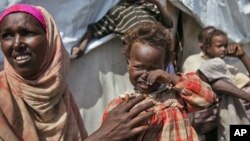The United Nations has announced the famine in southern Somalia is officially over, but warns that millions of people are still in crisis. The head of the U.N. Food and Agriculture Organization (FAO) told reporters in Nairobi Friday the next 100 days will be crucial.
FAO's new Director-General Jose Graziano da Silva delivered what he called “good news” following his trip this week to southern Somalia.
“We just received the new data from [the] Food Security and Nutritional Analysis Unit in Somalia and we can say no more [is] any region in Somalia under famine conditions," da Silva said.
The FAO director says long-awaited rains, an improved harvest and the enormous humanitarian response to the famine during the past six months helped lower the famine classification. Still, the United Nations cautions that hunger in Somalia and other regions of the Horn of Africa remains a serious threat.
The FAO and the Famine Early Warning Network says more than 2 million people in Somalia - or 31% of the population - are still in need of emergency humanitarian assistance.
Da Silva warns that without a continued humanitarian intervention during the next 100 days, conditions could again deteriorate.
“If we do not keep support, especially those three months that we have in drought season until the rainy season in April, those people will not survive," da Silva said. "We will have famine back.”
The FAO says it is supporting Somali farmers through seed distributions as well as a cash-for-work program that aims to sustain local markets. Following a good harvest in the recent rainy season, refugees have started slowly returning to southern Somalia. The U.N. Refugee Agency says more than 7,500 people left refugee camps in Ethiopia and Kenya in January.
Hundreds of thousands of people were displaced from southern Somalia last year due to an intense cycle of draught and unrelenting insecurity in the region. The United Nations says tens of thousands have died since the famine was first declared in July.
UN Declares End of Somalia Famine
- By Gabe Joselow












